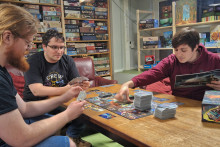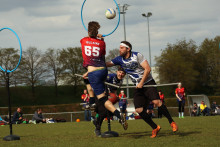With more than 45 years of entertainment, board game association Fanaat is one of the oldest associations in the UT. Board member Petar Dimitrov briefly sums up what makes it so much fun: 'Board games! What else do you need to know?' Walking memory and 'grandpa' of the club Remco Swenker adds: 'You will find like-minded people here, especially nerds who are looking for a pleasant evening.'
In the Bastille, next to the hunger-inducingly fragrant Subway, a sign with a flapping dragon on it beckons invitingly in front of two white doors: 'We Are Open: Dragon Cellar'. Immediately behind it, above the downward staircase, the wall features a fantasy landscape in soft colours. Between the low ceiling and shelves upon shelves packed with library books, are more shelves, full of board games, strategically placed in the aisle to create nooks. In them, gaming tables and chairs, where visitors can read or play. Stacks of colourful boxes with resounding names such as The Witcher, Wingspan, Calico, Codenames, Magic Maze and Simurgh scream for attention from the shelves. More than 700 games in total, Swenker says with slight pride.
One thing leads to another
Special note: Fanaat once originated from that other association that hides in the Drakenkelder: Bellettrie, the reading club. Swenker explains: 'In the early days of the UT, there was no TV or internet. So students mainly entertained themselves with books. But in between, the question came up more and more often: 'Can we also come here for a game of checkers?'
Today, which of the two clubs has more members is a bit of a gamble. Fanaat has about 110 this year, almost double from last year's 70. 'Let's put it this way: Sometimes is a challenge to find the balance here,' Dimitrov describes it carefully. 'Some of us get rather excited while playing, and that is not always appreciated by those who want to sit here and read.'

Competitive
Every Tuesday and Thursday from 19:00 hours it is game on, at Fanaat. 'How many people show up per evening depends very much on the season. Usually, we see a peak at the beginning of the academic year. When it gets colder, people prefer to stay at home, and we generally get about ten players per evening. When the temperatures rise, we notice that people come here to sit in the cellar, because it is cooler here.'
According to Dimitrov, there is no average, stereotypical board player. 'Most people here come for the social aspect, to meet like-minded people and to immerse themselves in a game.' Going to the pub afterwards isn’t common either, the board games are enough for real Fanatics. 'By the way, drinking at the gaming tables also prohibited; We like to keep our games in top condition, and there is always a chance that someone knocks something over.'
However, some can be more competitive than others, so it can happen that a few do not want to continue playing with someone else. 'What connects everyone here is a love of good storylines. That is also the overlap between Bellettrie and Fanaat and also with Japanese manga and anime club Konnichiwa,' Swenker explains.
Role play
At Fanaat, players can opt for both board games and so-called Role-Playing Games (RPG), in which participants play characters with certain characteristics in a fictional world. Often, there is a fictitious goal or mission. Players determine the course of the game with their decisions, based on their characters’ traits. "Some missions can be completed in one evening, but I know someone who leads a game world in which people have been playing stories and missions for thirty years now," says Swenker.
He shows a table in the back of the room. Suspended from a few pulleys above it is a plate. He explains: 'Games that take longer than a typical evening can be laid out there. When the evening is over, we hoist the plate up and everything is clean, but next time, you can quickly resume the game.'
In general, the Fanatics play for fun, but sometimes the club also organises tournaments. For example, for the card game Tichu. Every other Friday is theme night, where, for example, players can try to solve a murder mystery of have a go at Bingo.

Birth cellar of legends
The Dragon Cellar is also the birthplace of a few —at least in the Netherlands— world-famous games. 'The legendary game developer Martin Medema was a UT alumnus. Many of his games, such as Atlantis and Battlestar Galactica, he tried out here first," Swenker beams. In a secluded corner, a screen lies flat on the table. 'You can load and test your own games on it,' Dimitrov explains.
In the same corner there is also an old Nintendo on a shelf. 'There is increasing interest in that first batch of digital games. That's why we offer it more and more," says Dimitrov, and he adds that Fanaat sometimes also host LAN parties.
Game collective
But there are even older games, Swenkers knows. Some are real collectors' items and have been owned by Fanaat since the 1970s. He is not afraid of theft. 'They are marked with the old stamp of Fanaat. And there's an online list of what games we have here. If you try to sell such a game online, everyone immediately knows where you got it from and that you didn't get it fairly.'







